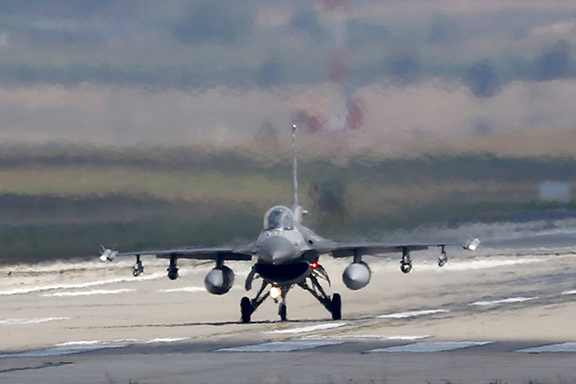
Turkish jet lands at Incirlik air base in Adana, Turkey in August, 2015. (Photo: Reuters)
ISTANBUL, WASHINGTON (The Wall Street Journal)—Turkish jets bombed U.S.-allied Syrian Kurds battling Islamic State, as Ankara and Washington’s competing priorities in the multisided Syria conflict strain ties between the two North Atlantic Treaty Organization allies.
There were conflicting reports on Thursday about who was hit in the overnight attack, and the death tolls varied significantly.
As many as 200 Kurdish People’s Protection Units, or YPG, fighters were killed in 26 strikes on 18 targets, the Turkish military said, in what would appear to be Turkey’s deadliest strike yet on Syrian Kurdish fighters.
The U.S. is working to assemble a force to retake Raqqa, Islamic State’s de facto capital in Syria. The goal is to limit the militants’ ability to aid comrades in other strongholds in Syria and Iraq, and to seal off escape routes for fighters who might try to flee to Europe. Read More
However, the Syrian Democratic Forces—which includes Arab and Turkmen fighters but is made up mostly of YPG members—contested Turkey’s claim, with spokesman Ahmad Hisso Araj putting the casualties at 15 people, including civilians.
The death toll couldn’t be independently verified.
A U.S. official said the Turkish strikes hit Kurdish positions in and around the northern Syria region of Afrin. The Afrin Kurds are allied with Kurdish forces further east whom the U.S. is arming and advising, but they are not direct U.S. partners, the official said.
Still, the Turkish strikes elicited dismay in Washington by upsetting Kurdish allies the U.S. is preparing directly to retake the Syrian city of Raqqa from Islamic State and make other gains against the extremist group in northern Syria, the official said.
Turkey’s attack comes as President Recep Tayyip Erdogan is becoming increasingly assertive in the Syrian and Iraqi conflicts, sparring with Baghdad and NATO allies while threatening to act unilaterally if the U.S.-led coalition against Islamic State fails to address Ankara’s concerns.
“We will not wait for troubles to come knocking on our door,â€
